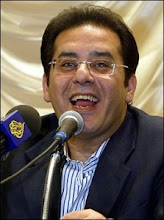Monday, November 30, 2009
Ayman Nour: A visit to Gaza
Sunday, November 22, 2009
Ayman Nour: Human dignity in Egypt
Wednesday, November 18, 2009
Sunday, November 15, 2009
Ayman Nour: Public Prosecutor is not Independent, Mr. Aboul Gheit
Wednesday, November 11, 2009
Egyptian Activist Nour Presses For More Rights in Political Process
 Ayman Nour giving interview to VOA (03 Jun 2009)
Ayman Nour giving interview to VOA (03 Jun 2009)[http://www1.voanews.com/english/news/a-13-2009-11-11-voa21-69822552.html]
Sunday, November 8, 2009
Ayman Nour: Egypt opposition versus the government
Thursday, November 5, 2009
EGYPT: Activist Ayman Nour blasts authorities for travel ban
EGYPT: Activist Ayman Nour blasts authorities for travel ban
Opposition leader Ayman Nour has attacked the ruling regime after he was barred from traveling to the United States, where he was invited to speak about Egypt's political climate at the Carnegie Endowment for International Peace in Washington.
Nour and a number of Egyptian politicians, including Gamal Mubarak -- a top official in the ruling National Democratic Party and the son of President Hosni Mubarak -- were invited to the Carnegie event. Nour said he is convinced that his travel ban was intended to prevent anti-government figures from spoiling Gamal Mubarak's trip.
"Mubarak's son wants the lion's share of the Egyptian political sphere, whether that is inside or outside the country," Nour said. "But I will not give him such pleasure, and I will take part in the Carnegie seminar through video conferences."
The founder and former head of El Ghad opposition party, who was also planning to take part in a number of conferences organized by the Egyptian community in the U.S., previously said that the Egyptian public prosecutor had issued an administrative decision preventing him from going to the U.S. and other nations in the Middle East and Europe.
Gamal Mubarak is being groomed to succeed his father, a scenario resented by many Egyptians who have suffered under the government's economic programs and repressive human-rights policies and don’t want a Mubarak dynasty. Nour and fellow opposition activists and parties recently formed a coalition under the slogan Mayehkomsh ("You don't have the right to rule"), rejecting any succession plan.
After losing to Hosni Mubarak in Egypt's first contested elections in 2005, Nour was sentenced to five years in prison on what are widely regarded as trumped-up charges of forging signatures in order to establish El Ghad party. He was released on health grounds in February and since then has only been allowed to leave the country to receive healthcare abroad.
Nour, who has been touring Egyptian cities to interact with citizens and demonstrate his political vision over the last few months, can't run in the 2011 presidential elections because of his earlier conviction.
Monday, November 2, 2009
I Reject Anti-Semitism and Respect Egypt's Pluralism
Published on Wall Street Journal
The authors of "Why Are Egypt's Liberals Anti-Semitic?" (op-ed, Oct. 26), Amr Bargisi and Samuel Tadros, quote me at a conference I was invited to attend in the city of Port Said, Egypt shortly after my release from prison after contesting President Hosni Mubarak in the 2005 presidential elections.
I would like to clarify a few points regarding the statements attributed to me in the article. First, neither myself nor my party, El-Ghad, were the organizers of this forum. I was invited to attend in my personal capacity, and to make a short statement. I was not responsible for any graffiti or items placed on the banners in the conference.
Furthermore, my statements referred specifically to Israel's conduct during the Gaza war, which in my opinion was highly objectionable.
I was distraught over the excessive loss of civilian life in Gaza, and I regret that my comments were expressed in a way that was unclear and that may have understandably offended.
Anyone examining my record can easily discern that I have always supported and upheld Egypt's peace treaty with Israel, and have strongly opposed calls of aggression against Israel.
I have also consistently called for a peaceful and just resolution to the Arab Israeli conflict. I gave a recent interview published in Commentary magazine where I stated, "El-Ghad supports every treaty made by Egypt before and will keep it going. We want to ensure peace with every country in the world."
I would like to conclude that the "anti-Semitic" label is one that I strongly reject. My critiques pertain to the conduct of the state of Israel in certain contexts and not to the Jewish people as a whole. The history of Egypt is replete with contributions from Jewish Egyptians, and that history of pluralism that once defined Egypt is one that I recall fondly and deeply respect.
Principles of religious pluralism and mutual respect and tolerance are principles that I strongly advocate not just in my position as a political activist, but as a human being.
Ayman Nour



